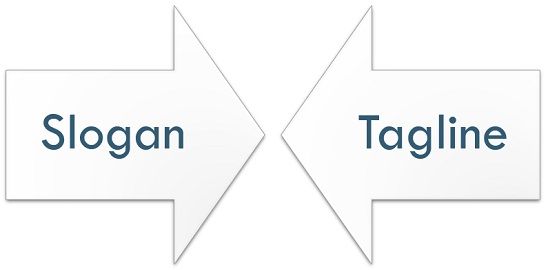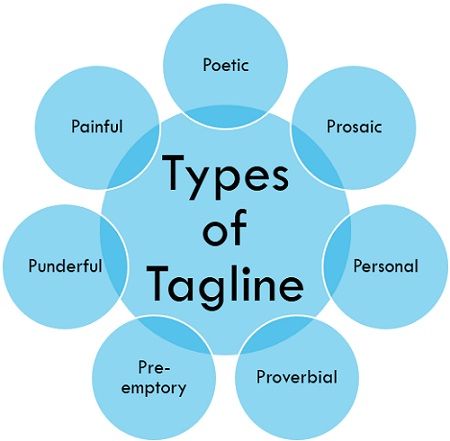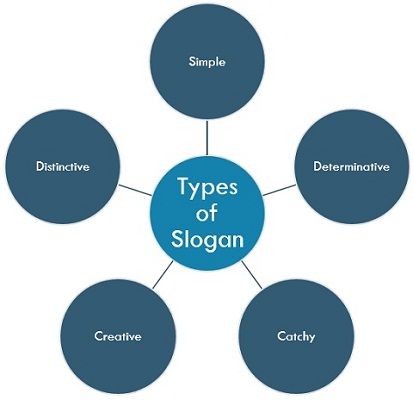 The term ‘slogan‘ can be understood as any concise and easily remembered statement used in campaigns to advertise something. On the other hand, a tagline is a simple, powerful and remarkable description of about a few words which is associated with the firm.
The term ‘slogan‘ can be understood as any concise and easily remembered statement used in campaigns to advertise something. On the other hand, a tagline is a simple, powerful and remarkable description of about a few words which is associated with the firm.
In the era of cut-throat competition, branding plays a prominent role, because there are many companies offering the same product with the same quality, quantity, price and even with the same brand message. Hence, it becomes essential to develop a differentiated brand identity. The three main components of brand identity are – logo, brand name and slogan, wherein each one of them performs a distinctive function.
You might have noticed that slogans have become an indispensable part of our day to day life, be it a mall, bus stand, railway station, office, clubs or any other market place.
In this content, we are going to discuss the difference between slogan and tagline, which people perceived as one and the same thing but they are not.
Content: Slogan Vs Tagline
Comparison Chart
| Basis for Comparison | Slogan | Tagline |
|---|---|---|
| Meaning | A simple and clear phrase, used to advertise something, is called a slogan. | A tagline is a short and catchy expression, used to give a message to the general public, about the company. |
| Meant for | Product or ad campaign | Company |
| Flexibility | Flexible | Rigid |
| Appears in | Display Ads, Campaign Commercials or Packaging | Public-facing messaging |
| Time Horizon | Short term | Long term |
| Objective | To show or prove, that the company's product is different from that of its rivals. | To succinctly explain what the company is all about. |
Definition of Slogan
A slogan can be described as a noteworthy phrase used in a political, commercial and religious context, often recurrently to convey an idea or motive, of any party, manufacturer or group, so as to induce the targeted audience or group of people to act accordingly.
Slogans are developed for different marketing efforts, expecting that the customer will notice and memorize it. And whenever he/she needs that product, the consumer will choose that product over others. It expresses the key benefits which the offeror wants its consumers to connect with it.
For a promotional slogan to be successful in introducing the brand, product, person, idea or event, it should be easily understood by the targeted audience.
Types of Slogans
- Simple: The effectiveness of a slogan depends on its relevance and meaningfulness. And so, its simplicity will help people understand it easily.
- Determinative: Slogans which symbolizes the intention of the brand while making sense of the entire ad, are also easy to remember.
- Catchy: Catchy slogans which make use of rhyming words, also becomes unforgettable.
- Creative: Slogans which aim at recalling something memorable or invoking a novel way of thinking in consumers are creative slogans, which also stay in the minds of people for the long term.
- Distinctive: As the name suggests, these are unique slogans used by the firm, to distinctively convey their message to the audience.
Definition of Tagline
A tagline is defined as a brief statement which expresses the strategy, personality, essence, message and positioning of the brand. It uniquely distinguishes the company from its competitors. It is simple and not whimsical, that is created through the strategic and creative process.
A tagline acts as a transcript of what brands stand for and what it offers. It describes the basic emotion or feeling which the manufacturer wants its audience to connect with. It can be humorous, serious, aspirational or informational.
A tagline is created as an enduring brand element which is used across various media platforms, generally in all the places where the logo is displayed. It also proposes a bottom line at the end of the piece of communication. As well as it appears consistently on the brochures, manuals etc.
Further, it is translated into different languages so as to ensure that the meaning is conveyed properly. A tagline is often less important than the name.
Types of Tagline
There are seven basic types of taglines:
- Poetic: When the tagline is poetic, it rhymes or makes use of popular poetic devices.
- Prosaic: These are simple statements of fact or genuine promises which are absolute and beyond doubt.
- Personal: Where the tagline grabs the customer’s attention and directly addresses them with the help of first-person singular or plural pronoun.
- Proverbial: These are the ones similar to old proverbs, quotes or sayings.
- Pre-emptory: Such taglines are authoritative, imperative or commanding.
- Punderful: As the name suggests, punderful tagline is a wordplay, which makes a pun
- Painful: The taglines of this category are unremarkable or mundane, which the customer can easily forget.
Key Differences Between Slogan and Tagline
The differences between slogan and tagline are discussed in the points below:
- A slogan is a small, memorable and catchy phrase that succinctly expresses the offering’s appeal or the goal of the party. On the contrary, tagline refers to a striking, reiterated line or statement which clearly expresses the brand message.
- While a tagline is for the business, brand or institution, a slogan is for the ad campaign, idea, product, or person, you are advertising.
- A slogan is flexible, in the sense that it can change over time, as well as it changes with culture. In contrast, taglines are rigid in nature, which remains the same over the generations.
- A slogan appears in Display Ads, Campaign Commercials or Packaging. Conversely, a tagline appears in public-facing messaging.
- Slogans are made to develop a lasting impression in the mind of the audience for a short term. As against, taglines are or long term, i.e. they do not change with the product, rather, they are used as the punchline in every business communication. Hence, they are created with an intent to remain in the mind of people for the long-term.
- Slogan aims at showing or proving, that the company’s product is different or say better than the product offered by its rivals. On the contrary, a tagline is used to succinctly explain what the company is all about.
Conclusion
The marketing efforts of the company mainly concentrates on getting the attention of the audience. In this way, taglines and slogans are used strategically by the firm to get the desired response from the consumers.







Leave a Reply